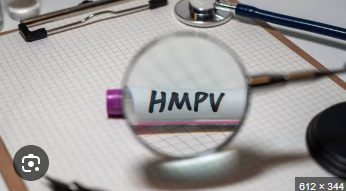Manas Dasgupta
NEW DELHI, Jan 6: The centre has once again advised people not to panic even as three cases of Human Metapneumovirus (HMPV) were detected in India by the Indian Council for Medical Research (ICMR) on Monday, the first in the country, amidst massive surge of the disease causing respiratory problems reported in China.
The three cases detected in India included a 3-month-old baby who has been discharged and an 8-month-old who is recovering at a hospital in Bengaluru – and a 2-month-old in Ahmedabad. This marks the first reported cases of HMPV in India. The infected infants and their families have no recent travel history, ruling out exposure from other regions or countries.
“Both cases were identified through routine surveillance for multiple respiratory viral pathogens, as part of ICMR’s ongoing efforts to monitor respiratory illnesses across the country. HMPV is already in circulation globally, including in India, and cases of respiratory illnesses associated with HMPV have been reported in various countries,” the Centre said in a statement on the two Bengaluru cases.
Earlier, the child in Ahmedabad was kept on a ventilator, but his condition is stable now. “HMPV (infection) was detected in the patient on December 26, but we learnt about it today as the private hospital reported it to us late,” Ahmedabad Municipal Corporation’s chief medical officer Bhavin Solanki said on Monday.
The Health Ministry has convened a meeting on HMPV preparedness. HMPV is a respiratory virus that often causes mild symptoms resembling a cold but can lead to other complications, particularly in infants, the elderly, and those with weakened immune systems. The virus can occasionally trigger pneumonia or exacerbate chronic respiratory conditions. Cases typically rise during the winter and early spring.
The Centre announced on Sunday that it is monitoring HMPV and other respiratory viruses, especially following recent reports of increased respiratory illnesses in China. A Joint Monitoring Group (JMG) convened on January 4 to evaluate the situation, with representatives from the World Health Organisation (WHO), National Centre for Disease Control (NCDC), Indian Council of Medical Research (ICMR), and other health organisations participating.
Respiratory illnesses in China align with seasonal variations caused by viruses such as influenza, RSV, and HMPV. Current surveillance data from India does not indicate any unusual surge in respiratory infections, according to the Ministry of Health and Family Welfare.
As a precaution, the Centre has increased laboratory capacity for HMPV testing. The ICMR will monitor HMPV trends throughout the year, alongside other respiratory illnesses such as influenza-like illness (ILI) and severe acute respiratory infections (SARI). A robust network of surveillance systems, including those operated by ICMR and the Integrated Disease Surveillance Programme (IDSP), continues to track respiratory infections across the country.
Hospitals have been advised to strengthen isolation protocols for suspected cases, ensure the availability of essential medicines, and promptly report ILI and SARI cases through the Integrated Health Information Platform (IHIP).
But even though the Centre and the ICMR has advised people not to panic and have asserted that “HMPV is already in circulation globally, including in India,” lockdown has started trending on the social media as reports of HMPV outbreak in China emerged with people drawing parallels between the HMPV surge and the COVID-19 outbreak in 2019-2020 in China, which later led to a global pandemic. Covid cases were first reported in November in China’s Wuhan and it rapidly spread to other countries. India reported its first case of COVID-19 in January 2020 in Kerala.
India was among the countries worst affected by the COVID-19 outbreak after the US. People fear that the surge in HMPV cases could lead to another global outbreak and force governments to enforce a lockdown to control the spread. However, medical authorities are telling people “not to panic” since the virus has been under circulation globally and is not a new pathogen.
“It is emphasized that HMPV is already in circulation globally including in India and cases of respiratory illnesses associated with HMPV have been reported in various countries. Furthermore, based on current data from ICMR and the Integrated Disease Surveillance Programme (IDSP) network, there has been no unusual surge in Influenza-Like Illness (ILI) or Severe Acute Respiratory Illness (SARI) cases in the country,” the ICMR said.
Mr Harsh Gupta, Karnataka’s Principal Secretary (Health and Family Welfare), said HMPV is usually detected in children under the age of 11 and about 1% of all samples tested for respiratory illnesses are HMPV. “This may not be the first case as monitoring was not being done earlier. However, there is no need to panic as HMPV is like any other respiratory virus, which causes a common cold and flu-like symptoms during winter, especially among the younger and older age groups,” he said.
“I don’t think we should be pressing the panic button, because HMPV is not a new virus, it already exists. Reports suggest that it is the first case of HMPV in India, this is not true because HMPV is an existing virus, and a certain percentage of people do get affected by this virus and it is not something new,” Karnataka’s Health Minister Dinesh Gundu Rao said.
Directorate General of Health Services (DGHS) official, Dr Atul Goel, assured people that, “There has been news doing the rounds about a Metapneumovirus outbreak in China. Let me be very clear on that count. Metapneumovirus is like any other respiratory virus which causes the common cold, and in the very old and the very young it could cause flu-like symptoms.”
“Human Metapneumovirus (HMPV) is not a new virus. It has been part of the circulating flu virus in India for long. Hence, the majority of the Indian population has developed immunity against it,” Dr Harshal R Salve, Additional Professor, Centre for Community Medicine at AIIMS, New Delhi, said. He added that the “chances of severe disease are very rare.”

